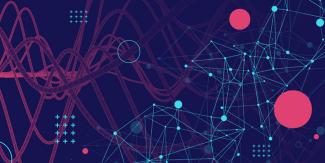Data is everywhere. We are consuming, generating and sharing data. From the news we engage with to the items we shop for, the entertainment we watch, read, or listen to, and even the conversations and interactions we have on our devices, data is being used to shape our lives and the world around us.
Perhaps the biggest reminder of that fact was during the height of the COVID-19 pandemic when transmission, hospital and vaccination rates were top of mind.
And when it came time for Tulane University to create its Quality Enhancement Plan (QEP) for reaccreditation by the Southern Association of Colleges and Schools in 2021, COVID-19 was again often referenced — but this time in the support of data literacy.
The SACS reaccreditation process, which Tulane undergoes every 10 years, requires the university to create a QEP that enhances the educational experiences of the university. Following two years of planning and input by faculty, students and staff, the idea of The Data Hub was chosen as Tulane’s QEP.
This summer, through a transformational $12.5 million gift by Libby Alexander (NC ’84), alumna and Board of Tulane member, and her husband, Robert, The Data Hub was renamed the Connolly Alexander Institute for Data Science (CAIDS). The gift will further support the institute’s goal of advancing Tulane as a leader in data-informed pedagogy.
“If anyone understands the importance of data management and analytics to the present and to the future, it’s Libby and Robert Alexander,” Tulane President Michael A. Fitts said. “Through their expertise and generosity, they have been instrumental in furthering and developing Tulane’s strategy for implementing data literacy and data science at every level of the university. We’re extremely grateful that the business success they achieved is now helping to drive this initiative at Tulane. Our students will reach new heights academically thanks to the support of this amazing Tulane couple.”
“The Connolly Alexander Institute for Data Science will make data fluency a defining characteristic of the Tulane experience,” Tulane Provost Robin Forman said. “Our goal is to help our students and faculty develop the awareness, understanding and skills they will need to successfully navigate an increasingly data-rich environment, and to be able to use data to make their own meaningful contributions whether that is to their academic disciplines or to any of the growing number of data-intensive professions.”
CAIDS moved into office spaces in the lower level of the Howard-Tilton Memorial Library on the uptown campus in August. Patrick Button serves as the inaugural executive director. They are an associate professor of economics at the School of Liberal Arts.
The key goal for CAIDS, Button said, is to make data literacy more accessible for everyone.
“Data-driven decision-making should not be done only by a select few,” they said. “We need leaders of all types and backgrounds, and we need to equip them with data literacy and data skills.”
CAIDS also aims to empower students with the skills and knowledge to utilize data and data analysis in their academic pursuits, research and their careers.
Button said students having data skills as a “competitive edge” in their careers is important since data-focused jobs are growing at a fast rate.
“For example, the Bureau of Labor Statistics estimates that the employment of data scientists will grow 36% over about the next decade, compared to 5% for all other occupations,” they said. “Even those who don’t want to be data scientists will need data skills, as more occupations will require them.”

































































